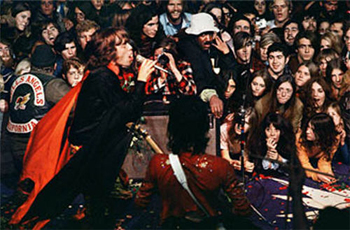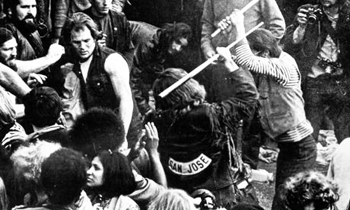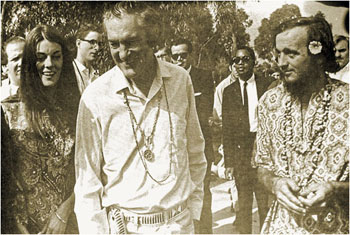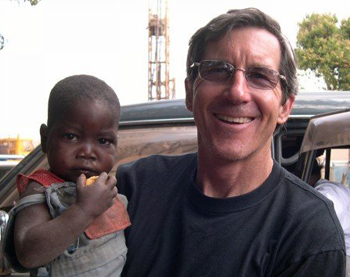By Mark Ellis —

Rolling Stone magazine called the free concert at Altamont Speedway on December 6, 1969 rock and roll’s worst day. With the Hell’s Angels guarding the stage in exchange for $500 in beer, the ensuing violence-tainted quagmire resulted in four deaths, four births, scores injured, and a countercultural black eye to those hoping for another Woodstock.
The concert began with Santana, then featured Jefferson Airplane, The Flying Burrito Brothers, and Crosby, Stills, Nash & Young. The Grateful Dead were scheduled to perform next, but refused to play due to the rising tide of discord and violence. The final act featured the Rolling Stones, who should not have gone on stage.
“The Rolling Stones came on, then the sun went down and they started singing ‘Sympathy for the devil’ and Lucifer descended to receive worship,” recalls Tom Ravensberg, who attended the event with his brother and 300,000 others.

The Hell’s Angels drank their allotment of beer most of the day in front of the stage and were highly inebriated. The crowd became hostile and unpredictable, attacking each other, the Hell’s Angels, and the performers. The Hell’s Angels armed themselves with sawed-off pool cues and motorcycle chains to drive the crowd further back from the stage.
“The Hell’s Angels pulled a bus in and were throwing full cans of beer, hitting people in the head with full cans of beer,” Ravensberg recounts. “All the bands came on and I wasn’t a Christian but I thought it was so wicked I told my brother, ‘We’re leaving.’ The Hell’s Angels stabbed a guy to death right after we left.”
Looking back at his early life, Ravensberg had a rough upbringing in Southern California. “I was clinically depressed from age eight,” he says. “I was so depressed. I was looking for love and couldn’t find it at home so at 17 I started smoking pot and dropping LSD and I was sure I would meet God in outer space.”
His father attempted to impose a measure of discipline and enforce boundaries for the young rebel. “My dad told me if I got a haircut, went to church with them on Sunday, do all the yard work, pay room and board, you can stay here or you can pack your bags.”
Ravensberg decided he couldn’t stomach these constraints, so he crammed his belongings into the back of a Volkswagen bug, where he lived for a year.
He visited Mystic Arts Bookstore in Laguna Beach to listen to Timothy Leary and sampled eastern religion and

meditation. Mystic Arts, which was part bookstore and part organic grocery, seemed to be the headquarters of Timothy Leary’s “brotherhood,” along with many other hippies in outrageous attire.
In the back room of the store was a dimly-lit prayer room, with incense burners, a fountain with a constant flow of water and a large Buddha statue on an altar.
Usually there were a half-dozen people sitting with their legs crossed, eyes closed, meditating. Occasionally they broke from the meditation to smoke a hash pipe, say “Om” dreamily, and go back into a trance.
“After drugs and meditation, I did what Siddhartha did,” Ravensberg recounts. “I went into the world and made a lot of money, thinking I would be happy.”
After he got his first haircut in a while, he ran a boiler room operation selling tools over the phone with 10 salesmen. “We were snorting diet pills and smoking and drinking coffee. You just amp up because you’re on the phone 12 hours a day. It was like the Wall Street movie without the sex, just insanity.”
After six years, the stress of this lifestyle began to take a toll on his health. “I think I had a minor nervous breakdown because it was 12 hours a day, six days a week, constant pressure.”
In the meantime, his first marriage was failing. “My wife was divorcing me because we had a horrible marriage. We were fighting and there was a lot of sin involved. I was not faithful. I couldn’t stand her and she hated me.”
“I was so convicted of sin selling tools and that my marriage was failing and I knew it was my fault and I was convicted I was just a horrible person. My parents were Catholic, but it never occurred to me to go to church.”
Ravensberg ventured into the Scientology Center in Tustin, California. He had read L. Ron Hubbard’s book,

Dianetics, found it convincing and thought it might help him.
“It cost $180 an hour and somebody would listen to you, so it was like having a therapy session. You couldn’t spend 20 years lying to yourself because you’re on a lie detector machine. If you start blowing smoke they say, ‘You’re lying,’ and they would keep you on track.”
One day there was a terrible automobile collision outside the Scientology Center and a couple of the auditors went outside to view the accident scene. A boy was dying and one of the auditors said, “Go ahead and die you’ll get born again, you’ll come back.”
“When he came back I knew he had encouraged this boy to die and he gave up the ghost. It struck me that this is something sick, something is off,” Ravensberg recalls.
After he spent $12,000 at the Scientology Center he came to a sobering conclusion. “I’m still the same person in the way I react to everything. I’m not a Dianetic clear. I have no self-control. I can’t control my anger.”
He went to his auditors at the center and announced he was leaving for good. “You guys are not helping me,” he told them.
“Oh, we looked at your lie detector readings and you are a dianetic clear,” they responded. “You’re ready for the next phase.”
But Ravensberg sensed they were lying to him; they wanted another $10,000 for him to continue.
“I was so depressed because I really thought they were going to help me. I couldn’t pay my mortgage and we were losing our house. I couldn’t stand myself.”
To make ends meet, he began to work with a man named Alan, hauling rubbish to the Brea dump on the weekends. Ravensberg began to pour his heart out to Alan about his desperate situation.
“You know Tom, I was suicidal in a mental hospital and Jesus came to me and said he would forgive me and give me new life,” Alan testified.
Ravensberg listened carefully, but was unconvinced. Alan talked to Ravensberg the next day about Jesus, but Ravensberg still didn’t respond.

“On the third day we were driving into the Brea dump and I looked and I realized I believed what he said. Faith had entered my heart. On the first day I had no faith at all. But the gospel is the power of God unto salvation and faith is a gift of God. God put faith inside me.
“I looked up to heaven at the Brea dump and got born again.”
The changes began to unfold dramatically in Ravensberg’s life after his redemption. “I left the old man at the dump. God has sustained me with his grace. I’ve never back-slidden into the world or anything. I think he wrote his law in my heart and sins just fell away.”
“My flesh, my selfish nature, I still have a lot of work to do, but surface sins like drinking, drugs, and pornography were just gone. I had no desire for them and I wanted to love Jesus and please him.”
If you would like to know more about a personal relationship with God, go here




I connect with his testimony, it is similar enough to my own battles in looking for a life purpose. I can really relate to the last lines, that for me, once I’ve honored Christ as our Lord, sympathizer, and friend that then the devils constant distraction of sin is so dimmed we don’t even pay attention to it.
With some thankful prayer I proclaim and rejoice that Christ is the light, where this worlds darkness will be instantly destroyed. In and through Christs name I pray, Amen.
Comments are closed.